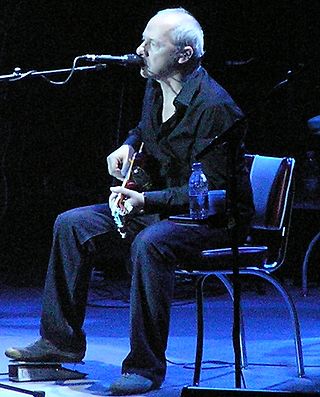
The most general definition of music is the arrangement of sound to create some combination of form, harmony, melody, rhythm, or otherwise expressive content.However, definitions of music vary depending on culture, though it is an aspect of all human societies and a cultural universal. While scholars agree that music is defined by a few specific elements, there is no consensus on their precise definitions. The creation of music is commonly divided into musical composition, musical improvisation, and musical performance, though the topic itself extends into academic disciplines, criticism, philosophy, psychology, and therapeutic contexts. Music may be performed using a vast range of instruments, including the human voice to sing, and thus is often credited for its extreme versatility and opportunity for creativity.

Mbira are a family of musical instruments, traditional to the Shona people of Zimbabwe. They consist of a wooden board with attached staggered metal tines, played by holding the instrument in the hands and plucking the tines with the thumbs, the right forefinger, and sometimes the left forefinger. Musicologists classify it as a lamellaphone, part of the plucked idiophone family of musical instruments. In Eastern and Southern Africa, there are many kinds of mbira, often accompanied by the hosho, a percussion instrument. It is often an important instrument played at religious ceremonies, weddings, and other social gatherings. The "Art of crafting and playing Mbira/Sansi, the finger-plucking traditional musical instrument in Malawi and Zimbabwe" was added to the UNESCO Representative List of the Intangible Cultural Heritage of Humanity in 2020.

Bluegrass music is a genre of American roots music that developed in the 1940s in the Appalachian region of the United States. The genre derives its name from the band Bill Monroe and the Blue Grass Boys. Like mainstream country music, it largely developed out of old-time string music, though in contrast, it is traditionally played exclusively on acoustic instruments and also has roots in traditional English, Scottish and Irish ballads and dance tunes, as well as in blues and jazz. It was further developed by musicians who played with Monroe, including 5-string banjo player Earl Scruggs and guitarist Lester Flatt. Monroe characterized the genre as "Scottish bagpipes and ole-time fiddlin'. It's a part of Methodist, Holiness and Baptist traditions. It's blues and jazz, and it has a high lonesome sound."
Ellen Taaffe Zwilich is an American composer, the first female composer to win the Pulitzer Prize for Music. Her early works are marked by atonal exploration, but by the late 1980s, she had shifted to a postmodernist, neoromantic style. She has been called "one of America's most frequently played and genuinely popular living composers." She was a 1994 inductee into the Florida Artists Hall of Fame. Zwilich has served as the Francis Eppes Distinguished Professor at Florida State University.
Given the vastness of the African continent, its music is diverse, with regions and nations having many distinct musical traditions. African music includes the genres amapiano, jùjú, fuji, afrobeat, highlife, Congolese rumba, soukous, ndombolo, makossa, kizomba,Taarab and others. African music also uses a large variety of instruments from all across the continent. The music and dance of the African diaspora, formed to varying degrees on African musical traditions, include American music like Dixieland jazz, blues, jazz, and many Caribbean genres, such as calypso and soca. Latin American music genres such as cumbia, salsa music, son cubano, rumba, conga, bomba, samba and zouk were founded on the music of enslaved Africans, and have in turn influenced African popular music.

Zimbabwean music is heavily reliant on the use of instruments such as the mbira, Ngoma drums and hosho. Their music symbolizes much more than a simple rhythm, as the folk and pop style styled music was used as a symbol of hope for Zimbabweans looking to gain independence from Rhodesia. Music has played a significant role in the history of Zimbabwe, from a vital role in the traditional Bira ceremony used to call on ancestral spirits, to protest songs during the struggle for independence. The community in Zimbabwe used music to voice their resistance to their oppression, as one of the only weapons they had available to fight back with. In the eighties, the Music of Zimbabwe was at the center of the African Music scene thanks to genres such as Sungura and Jit. However, several performers were banned by state TV and radio leading to the closing of several music venues.

Broken Social Scene is a Canadian indie rock band and musical collective including as few as six and as many as nineteen members, formed by Kevin Drew and Brendan Canning in 1999. Alongside Drew and Canning, the other core members of the band are Justin Peroff (drums), Andrew Whiteman (guitar) and Charles Spearin (guitar).

Teenage Fanclub are a Scottish alternative rock band formed in Glasgow in 1989. The group were founded by Norman Blake, Raymond McGinley and Gerard Love, all of whom shared lead vocals and songwriting duties until Love's departure in 2018. As of 2023, the band's lineup consists of Blake, McGinley, Francis Macdonald, Dave McGowan and Euros Childs.
Eurodance is a genre of electronic dance music that originated in the late 1980s in Europe. It combines many elements of rap, techno and Eurodisco. This genre of music is heavily influenced by the use of rich vocals, sometimes with rapped verses. This, combined with cutting-edge synthesizers, strong bass rhythm and melodic hooks, establishes the core foundation of Eurodance music.

The Zimbabwe men's national cricket team, also known as the Chevrons, represents Zimbabwe in men's international cricket and is overseen by Zimbabwe Cricket. Zimbabwe has been a Full Member of the International Cricket Council (ICC) since 1992. As of May, 2023, Zimbabwe was ranked 10th in Tests, 11th in One Day Internationals (ODIs) and 11th in Twenty20 internationals (T20Is) by the ICC.
Symphonic metal is a cross-generic style designation for the symphonic subsets of heavy metal music subgenres. It is used to denote any metal band that makes use of symphonic or orchestral elements. The style features the heavy drums and guitars of metal with different elements of orchestral classical music, such as symphonic instruments, choirs and sometimes a full orchestra, or just keyboard orchestration.

Oliver "Tuku" Mtukudzi was a Zimbabwean musician, businessman, philanthropist, human rights activist and UNICEF Goodwill Ambassador for Southern Africa Region.

The Raconteurs is an American rock band from Detroit, Michigan, formed in 2005. The band consists of Jack White, Brendan Benson, Jack Lawrence, and Patrick Keeler (drums). Lawrence and Keeler were originally members of the Greenhornes, while White and Lawrence went on to become members of the Dead Weather.

Brendan Ross Murray Taylor is a Zimbabwean former international cricketer and a former Zimbabwean captain, who played all formats of the game. Taylor is a right-handed batsman but is also an off spinner. In 2015, former Zimbabwe captain Alistair Campbell described Taylor as "our standout player for the last seven or eight years". He is known for his unorthodox shots especially his ability to play upper cuts over the third man and ramp shots with elegance and are often considered as his trademark signature shots. His style of play and ability to make substantial contribution with the bat often drew comparisons with that of Andy Flower. He represented Zimbabwe in four ICC T20 World Cup tournaments in 2007, 2010, 2012 and 2014. Also, he represented Zimbabwe in three ICC ODI world cups as well in 2007, 2011 and 2015.

"Only This Moment" is the first single from Norwegian duo Röyksopp's second album, The Understanding (2005). The track features Kate Havnevik on guest vocals and co-writing.

The Notting Hillbillies were a country rock project formed by British singer-songwriter Mark Knopfler in May 1986. The group consisted of Knopfler, Steve Phillips, Brendan Croker, Guy Fletcher, Paul Franklin, Marcus Cliffe (bass), and Ed Bicknell (drums). They gave their first performance at a small club in Leeds, and followed up with a tour.
Patrick Kelly (1905–1976) was an Irish fiddle-player and teacher.

Brendan Joel Zibusiso Galloway is a Zimbabwean professional footballer who plays as a defender for EFL Championship club Plymouth Argyle. A former youth international for England, Galloway represents the Zimbabwe national team.
The Zimbabwe cricket team toured Ireland in August and September 2021 to play three One Day International (ODI) and five Twenty20 International (T20I) matches. The ODI series formed part of the inaugural 2020–2023 ICC Cricket World Cup Super League. Cricket Ireland confirmed the fixtures in February 2021. Originally, three T20I matches were scheduled to be played, but two more T20I matches were added in April 2021, after planned matches against Pakistan were cancelled.

Corruption is an album by the Zimbabwean musician Thomas Mapfumo, released in 1989. The album criticized the government of Robert Mugabe. Mugabe's displeasure with the criticism eventually forced Mapfumo into exile, and Mapfumo's music was barred from Zimbabwean radio. The title track was discussed in the Zimbabwean parliament, around the same time as several government officials were indicted as part of a smuggling ring.













